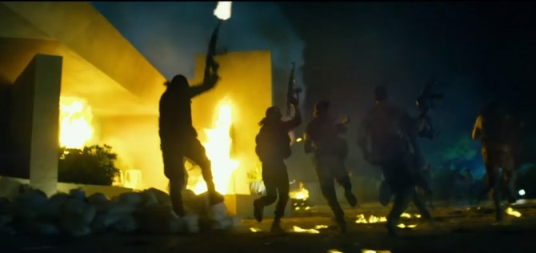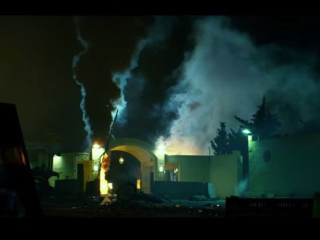I am not exactly a Michael Bay fan. I love the Team America: World Police song (even though I’d never even considered going to see Pearl Harbor). I liked Armageddon‘s over-the-top comic-book-ness, and (as if often noted) The Rock is actually a pretty good movie. Granted, The Island was a trial to sit through, but that doesn’t stop me from wanting to see Pain and Gain.
What 13 Hours does, from a moviegoer’s perspective, is remind us that Bay probably just makes the kinds of films he wants to make, even if that’s not the sort of film that’s likely to garner awards or critical praise—which, on the flip side means he’s kind of immune to them trashing him for political reasons, as with this film, which has a 51/87 Rotten Tomatoes split—worthy of a Christian film! (Risen, right now, has a 52/78 split, and the newly released Miracles From Heaven has a 54/84 split. Man, critics hate Jesus, don’t they? Jesus and soldiers.)

Seen here: Kenneth Turan and a soldier.
Despite the audience approval, however, this wasn’t a big hit, which is interesting. It’s easily his best film. It’s as apolitical as it can be, which perhaps isn’t very apolitical, given the election year. But no names are named, other than the victims. If this had occurred under a Republican President, I would have expected to see clips at the end of the President and Secretary of State lying about this being about a video, and using that lie to get the President re-elected. The closest we come to that is characters commenting that the news reports (about protests and a video) are wrong.
Which is fine.
Part of being a soldier, even a mercenary—which topic I’ll come back to—means not just that you are laying down your life in a good cause but that you are laying down your life in the hands of people who may capriciously dispose of it. Soldiers, I think, generally know this. As a society becomes more decadent, this calculus must become increasingly challenging, leading either to an enervated armed force (as under Carter) or a military coup.

And then this happens.
Which brings us to the events of September 11, 2012, as portrayed in this film. And, scanning the published reviews of this film, I see no one objecting to the accuracy of the portrayal, which includes dialogue and action that was recorded. (The whole thing was being watched from a distance, I think from Tripoli.) Mostly the complaints are “the wrong sorts of people will enjoy this” and “not enough emphasis on the US sucking.” And, of course, the people cavilling over whether or not a “stand down” order was given are morons: Of course a “stand down” was given—you couldn’t otherwise expect these guys to not help.
And by “these guys” I mean, “the men and women of the armed forces”. Because that’s the ethos. And it remains even when you’re retired and “mercenary” as shown here.
This is, as I’ve mentioned, a good movie, and easily Bay’s best. As you’d expect, the action sequences are top-notch. They are occasionally confusing, but this is deliberate: Half the time our protagonists don’t know what’s going on, particularly when natives are involved. Some are friendly, some are not. How can you tell the difference? Well, you have to ask. (I’ve forgotten what they said, but they said it a lot: Something like “17 Feb?“, to which the natives would reply “17 Feb!“)

I’m assuming the answer varied based on who was asking.
It’s surreal, on the one hand, to ask your enemies if they’re your enemies, sure. It’s even more surreal that it apparently works to some degree. It’s even more surreal when your friendlies can call your enemies on the phone. Says the guy making the call to an on-edge soldier, “I’m a good guy. But I know the bad guys.” This surreal aspect gives the action a kind of Apocalypse Now feel at points.
One complaint: On a couple of occasions, some folks are shot and fly backwards through the air. That was weird in a movie that’s otherwise very true-to-life. (In case you’re unaware: That doesn’t happen. It can’t happen. If bullets had that kind of force, the person shooting them would also have to fly back through the air. Newton’s 3rd Law.)
Beyond the action scenes, we get genuine character development. Not so much for the late Chris Stevens and Sean Smith because they’re in this completely unsafe embassy—excuse me, “embassy outpost”—and not part of the main crew. Their two bodyguards (two!) get more time and development, because they at least make it back to the super-secret CIA installation, that’s surrounded by high walls and guards, and from which caucasian men and women occasionally emerge to roam around the city. (That’s good spying!)

Left-to-right: Chris Stevens, Tyrone Woods, Sean Smith and Glenn Doherty.
Again, I’ve seen some complaints that there’s no character development here, but it looks like most of the complaints are “I don’t know anyone like this” and “These aren’t the sort of people I’d associate with” and “These guys are nothing like Woody Allen!” But just because they’re not neurotic doesn’t mean they don’t struggle. They struggle because they’re far away from home—and voluntarily, in the sense they’re no longer in the military, though finances are significant here. They struggle because they have instincts that are countermanded by their bosses. (One has to conclude that Stevens and Smith—the latter being an IT guy/EVE Online guru just there to install a network!—might have been saved if not for the orders of the CIA base chief.)
But this movie underscores the sort of character we saw in American Sniper: They have families, lives, interests, who are smart and often funny, but for all their individuality, they react to danger with heroics rather than self-preservation. I’m not great at placing names with faces, so I had some real tension about which were going to live or die.
I’ve heard Michael Bay felt he was the right guy to do this movie, because in using so many military consultants on his movies, he’s grown to have an understanding of the military mindset, and a genuine empathy for the soldiers. I believe that’s true, and the movie reflects this. And one of the ways it reflects (and respects) this mindset is by not wallowing in grief or despair over tragic events. Heroes keep going.
13 Hours does not rise to the level of Blackhawk Down or even American Sniper but it’s fine storytelling, while hewing pretty closely to the truth. The Boy and I were both misty-eyed by the end, as we sometimes are in these military films.

Meanwhile, at the “Hillary for President” Headquarters

One thought on “13 Hours”